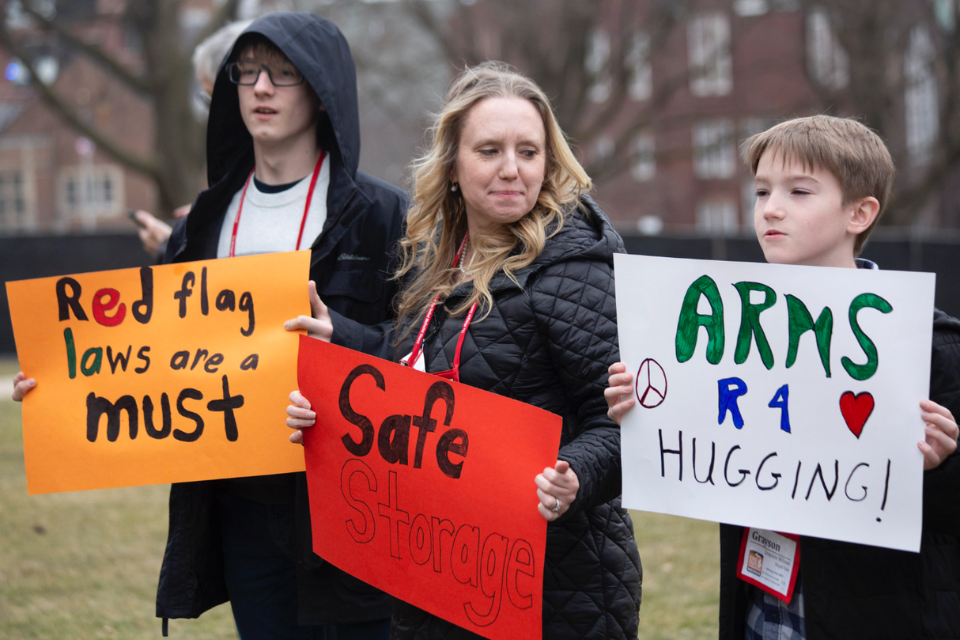Over 300 United Methodists and friends journeyed to Lansing to move hearts and minds on gun safety legislation through their stories and witness.
JAMES DEATON
Content Editor
LANSING, MI—On Mar. 22, over 300 United Methodists and supportive friends from across the state assembled at the Capitol for the Michigan Conference’s first Advocacy Day. This year’s event focused on the support of legislation that reduces gun violence.
Participants met with lawmakers to forward the momentum carrying a series of bill packages related to three common-sense gun safety measures: universal background checks, safe storage laws, and extreme risk protection orders. The movement to pass these bills has picked up steam after the legislative term began in January, and the Feb. 13 mass shooting at Michigan State University that took the life of three students and injured five others galvanized efforts.
Lansing: Central UMC, directly across the street from the Capitol building, was home for the day’s events. United Methodists from all corners of Michigan, reaching as far north as Engadine in the Upper Peninsula, traveled to join others for an energizing day highlighted by worship and fellowship, prayer, advocacy letter writing, and face-to-face meetings with legislators.
At 11:30 am, Advocacy Day leaders held a press conference and rally on the steps of the Capitol, with support from End Gun Violence Michigan (EGVMI). The Michigan Conference joined this gun safety coalition following the 2022 Annual Conference when delegates overwhelmingly adopted a resolution asking Michigan United Methodists to contact their elected officials to support legislation and funding to reduce gun violence.
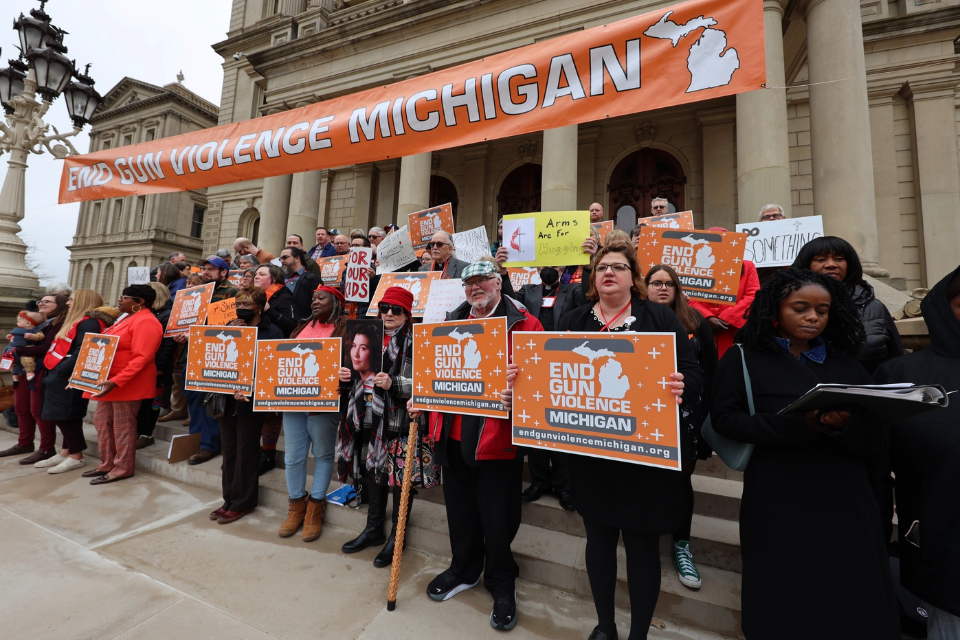
Advocacy Day was championed broadly by people of faith across the Michigan Conference, with 375 registered and over 300 in attendance. Because of this large turnout, 36 out of 38 Senate districts were represented, and 84 out of 110 House districts were represented.
Seasoned justice advocates stood alongside those who had never done anything like this before but felt compelled to step out in faith. There were people of all ages and backgrounds—teachers, retirees, pastors, physicians, hunters, veterans, college students, and many others—and they all came with their own stories of how gun violence had personally impacted them.
Even though participants varied in their opinions and political party affiliations, they united in support of the gun safety bills before state lawmakers. And they were doing this together as an act of love to help keep family members and friends safe and reduce gun violence in homes, schools, and public places throughout Michigan.
The call for an Advocacy Day was part of the resolution voted on at the 2022 Michigan Annual Conference. Later in the summer, Rep. Julie Rogers, a lawmaker from Kalamazoo who is a member of Portage: Chapel Hill UMC, suggested to Rev. Alice Fleming Townley, Mission and Justice Coordinator for the Michigan Conference, that the conference should sponsor an Advocacy Day in the spring. Townley engages congregations in a wide range of justice and advocacy matters.
This idea grew, and Townley and conference staff landed on March 22 and decided to focus only on gun safety advocacy, an issue the Michigan Annual Conference could easily get behind. Rev. Michelle King, a provisional deacon from Kalamazoo, was brought on board to assist Townley with the organizational heavy lifting to ensure the planning went smoothly. An Advocacy Day steering committee and the Michigan Conference Board of Justice worked closely with Townley and King. And the day’s events were made possible thanks, in part, to generous dollars from Ministry Shares given by United Methodist congregations, financial gifts which supported conference staff and the Board of Justice budget.
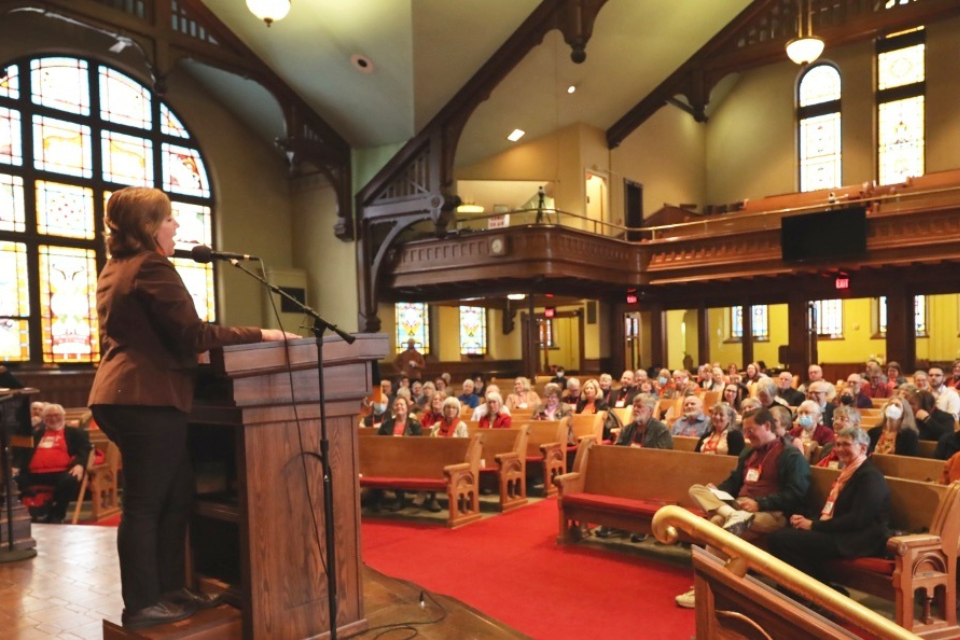
Central UMC’s towering historic building was bustling on Wednesday, as spaces on all three floors—gymnasium, fellowship hall, sanctuary, chapel, and many gathering rooms—buzzed with energy. Nancy Arnold and Sarah Vollmer staffed registration. Detailed signage and friendly Grace Patrol volunteers kept traffic moving efficiently.
After an 8:30 am rousing welcome by Advocacy Day organizers and church leaders in Central’s sanctuary, United Methodists split into groups based on their legislative district and readied themselves to meet with lawmakers. Most meetings occurred at the Capitol and the Anderson and Binsfeld buildings, which house the offices of many House and Senate members.
Three online trainings prior to Advocacy Day had equipped participants on how to prepare spiritually and mentally for conversations with lawmakers. A detailed roadmap for legislative meetings was given to each group, with instructions on choosing a group leader and notetaker. Participants had a good sense of how the meetings would go based on knowledge of a legislator’s voting record and their views on the issues. Of course, some legislators were more receptive than others. But the goal was to share their personal stories and plant seeds of hope.
Pre-scheduled appointments with lawmakers or their staff representatives had been scheduled for many groups, and those were held from 9:15 am to 2:30 pm. However, some could not meet with their senators and representatives since the legislators were absent or not receiving guests that day. In addition, other participants didn’t feel comfortable meeting with their legislators alone if they were the only constituent from a particular district.
But there were other ways to participate in advocacy. Some wrote letters and dropped them off at their legislator’s office. A letter-writing station was set up in the fellowship hall. Others asked to tag along with groups to get a sense of what it was like to meet with legislators. There were also opportunities to pray in the Capitol building and inside Central UMC’s chapel.
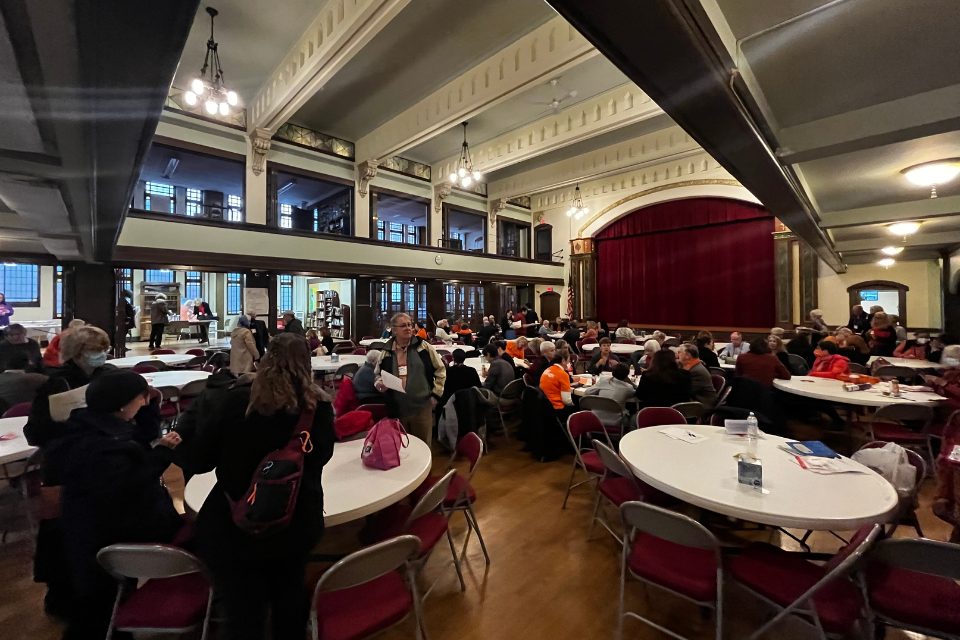
The most powerful part of Advocacy Day was the witness of the storytellers that spoke truth and shared their experiences. United Methodists told their stories throughout the day, from the steps of the Capitol building to conference rooms that held elbow-to-elbow meetings with lawmakers to pews and around tables and in stairwells within Central UMC. The storytelling moved conversations beyond partisan politics to personal matters of life and death and why people of faith are compelled to work fearlessly to end gun violence. And many participants believed it made a difference and moved lawmakers to change their minds and hearts in some way.
Since the Senate and House had already voted on and passed the bill package related to universal background checks on all firearms, regardless of type, Advocacy Day participants focused their storytelling on two other bill packages. The safe storage bill package would require gun owners to place their guns in a locking device or a secure holding place to prevent minors or anyone unauthorized from accessing them. The extreme risk protection order bill package, also known as “red flag laws,” would allow a judge to temporarily remove firearms from someone if the judge determines the person may be at risk for harming themselves or others with the firearm. Many of these legislative components are supported by a majority of Michigan residents, so it was beneficial for legislators to hear directly from constituents.
For Rev. Jackie Roe, pastor of Newberry and Engadine UMCs and director of God’s Country Cooperative Parish, coming to Lansing was an adventure of firsts, especially after having car issues on the way down. She considered driving back home, but she called her brother-in-law, and he advised her not to risk crossing the Mackinac Bridge but instead head to Gaylord to get her car checked.
Participating in an Advocacy Day was a first for Roe, and it was a matter of witness to show lawmakers that these matters were important to her as a person of faith. She even borrowed a clergy collar, which she never wears in her Upper Peninsula churches.
Roe said that even though she did not meet her legislators, she spent an hour praying with other United Methodists in the Capitol’s Rotunda. A group of about 30 took turns praying in silence for the day’s events. For Roe, this was a powerful witness.
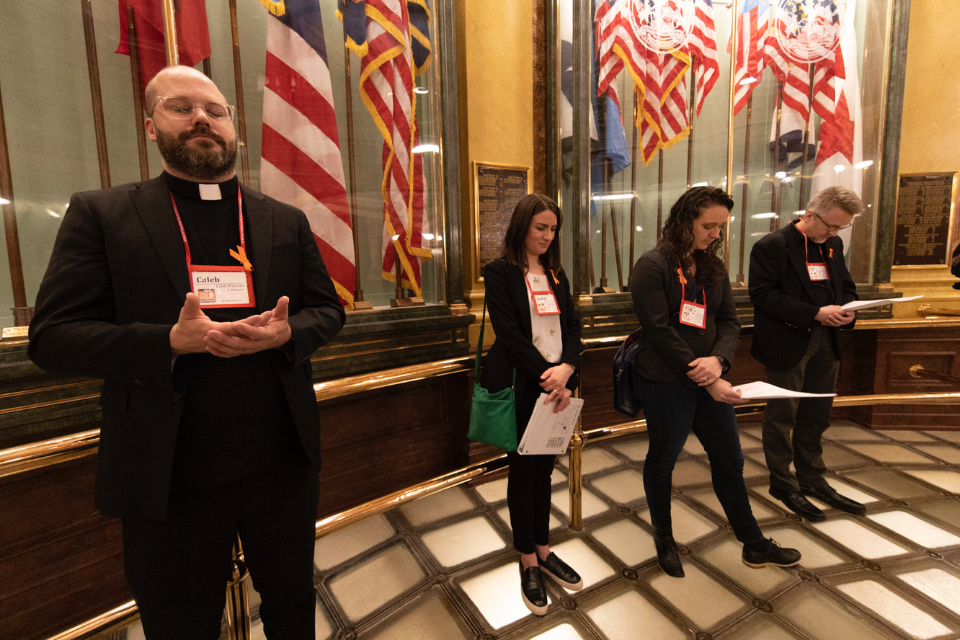
Laura Damschroder of Chelsea: First UMC was part of a group that met with Rep. Kathy Schmaltz’s (R-District 46) legislative director and aids. Rep. Schmaltz hadn’t made her mind up about the remaining bills, so it was an opportunity to move hearts and minds. The group acknowledged the courage it takes for someone like Rep. Schmaltz to stand up in support of these bills, for some elected officials have received threats.
The group also spoke about how every mass shooting, every suicide, and every homicide has a rippling effect on the entire community, traumatizing everyone. In addition, a church youth leader who was in real-time contact with students at MSU following the recent mass shooting expressed how the lasting effects of the violence are palpable in these young adults, and at least one is experiencing despair.
Lots of stories had MSU connections, whether it was a child, grandchild, or friend impacted. Many of the gun safety bills, in some form, that were on the docket had failed previously after the Nov. 2021 Oxford school shooting. Less than two months ago, the events at MSU motivated constituents to press lawmakers to enact legislation that will reduce the statistics showing gun violence as the number one cause of death among children and teens in Michigan.
Rev. Chad Parmalee, lead pastor at Livonia: Newburg UMC, is an MSU grad, and the Feb. 13 shooting moved him to action. Parmalee’s life experience includes officiating the funeral of Mary Jo Nye, one of the victims of the deadly Kalamazoo Uber shooting spree in 2016. Nye was a member of Battle Creek: Chapel Hill UMC at the time, and Parmalee was serving that church. “In 2016,” Parmalee noted, “gun violence was transformed from a problem to our problem, a reality to our reality.” This is no longer a problem too big to engage in.
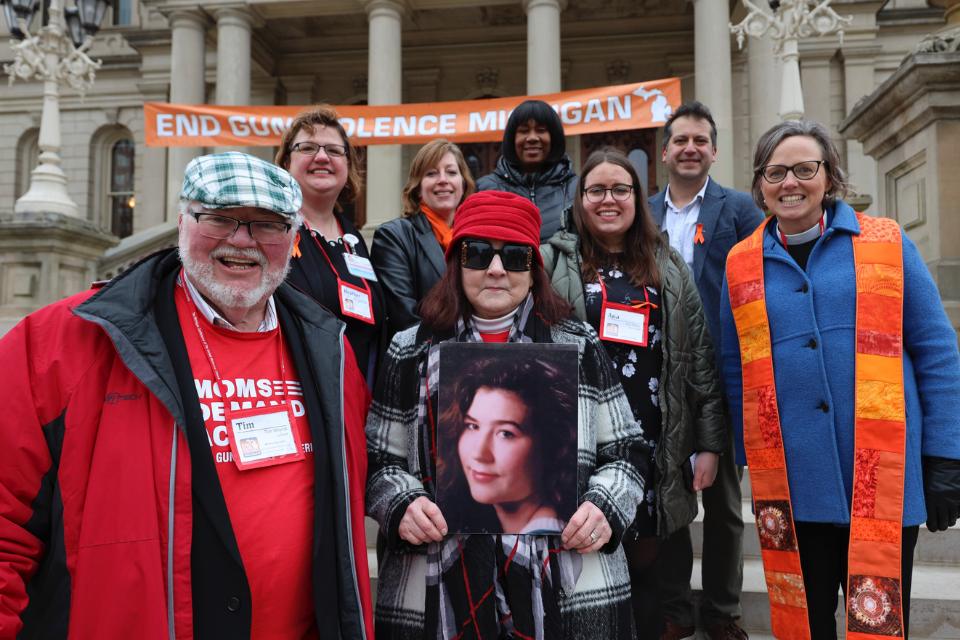
Jane Knapp of Scotts UMC, southeast of Kalamazoo, and Rick Omilian of Kalamazoo: First UMC both told their survivor stories to Rep. Matt Hall’s (R-District 42) legislative staffer, Tim Culver, who was receptive to the conversation and seemed in agreement on the need for middle ground.
Knapp told a story from the ’90s of her then-teenage son, who accidentally shot his friend after getting his friend’s father’s gun out of the nightstand. She reflected, “There are fingerprint storage safes for handguns. If the friend’s father had had his gun in one of these safes [back then], the boys could not have gotten access to the gun. This could have also helped in the [recent] case of the six-year-old who had his mom’s gun and shot his teacher. We have the technology—let’s use it.”
Omilian and his wife, Martha, shared about their daughter, Maggie, who was murdered in Oct. 1999 by an ex-boyfriend in a dorm room at Kalamazoo College. “There were warning signs in his behavior before Maggie died,” said Omilian, “that, in current times, could have been a red flag that he might be a danger to himself or others. He had bought the gun he used—a shotgun—from a local gun store using his ID with his college building address clearly indicated on it. The universal background check bill . . . would have put that transaction under closer scrutiny. These current law changes can save lives, giving someone like Maggie a chance at life.”
The gun safety bill packages put before the state legislature honor the rights outlined in the second amendment. Katherine and Eric Hanson of East Lansing: University UMC, who are gun owners, were part of the group of United Methodists that met with Rep. Penelope Tsernoglou (D-District 75), encouraging her to support the bill packages.
Eric said, “I made the point that we’ve owned guns forever, and we’re supportive of all three initiatives. The one that strikes me is safe storage. You create a little inconvenience for a gun owner, but it doesn’t take anybody’s rights away. You can put the lockbox next to your bedside and open it with your thumbprint. And so, it costs you a little money. But it’s protecting your kids.”
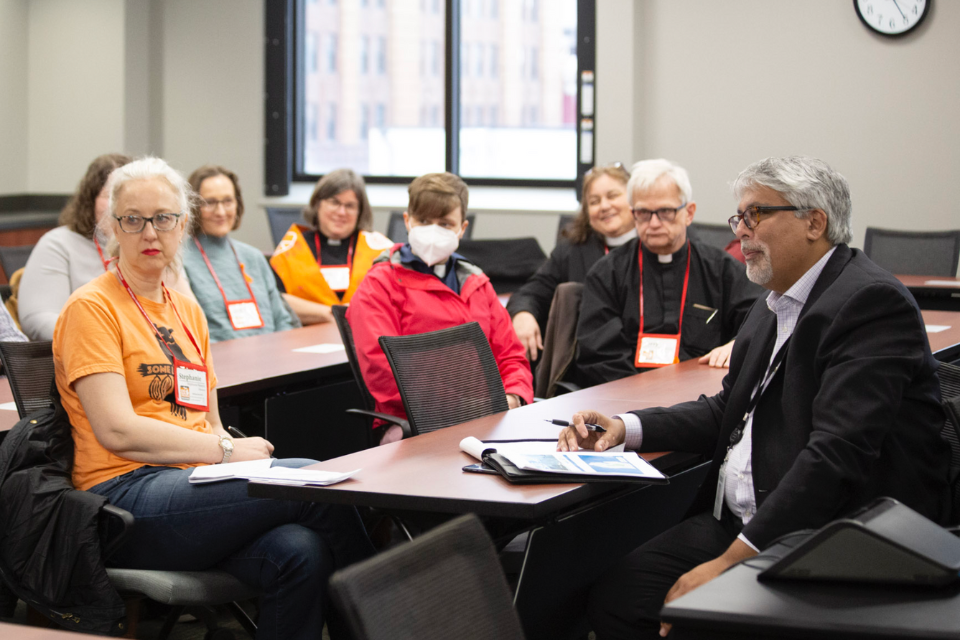
Elena Glinter, the middle school ministry leader at Northville: First UMC, is also a gun owner and served in the U.S. Navy. She told her story to Rep. Matt Maddock (R-District 51). She spoke of her first-hand experience, education, and training in handling weapons, and the need for expanded background checks that any gun owner should have no issue submitting to.
She also talked about her experience giving over 30 trainings in suicide education and prevention for the American Foundation for Suicide Prevention. She said, “The greatest factor in reducing a person who is at risk for harming themselves or others is space and time. Creating safe storage and extreme risk protection orders are the safest way to ensure security to individuals and society.”
Gun ownership is common in rural counties in Michigan, but there are marginalized populations that are at greater risk of being harmed by gun violence. When Rev. Mark Thompson, pastor of St. Ignace UMC, arrived in Mackinac County, he quickly discovered that the area has a significant indigenous population. In some local communities, alcoholism and drug addiction have been accompanied by the use of firearms, whether that be domestic violence or suicide. In fact, per capita, Mackinac County has a statistically high suicide rate.
Thompson drove down to Lansing to speak with lawmakers about the people in his communities and had the full support of his congregation, which is not always true for pastors. And he brought 16 letters from church members along with him. He said he would have had at least 60 letters to bring down if he had had a chance to get them into their hands sooner.
Thompson was inspired by Advocacy Day and plans to follow up after he returns home. He wants to create a revised letter, have his members sign copies, and then deliver them to the legislative satellite offices up north. He said, “My activism on this issue will not end today. My congregation will want it to continue.”
Working to stop the effects of gun violence on marginalized communities and racial minorities is also a concern for United Methodists in other parts of Michigan. Tina Campbell of Detroit: Grace Community UMC participated in Advocacy Day to work for justice and ask legislators to enact gun safety laws to better protect her Black and Brown siblings. Recent statistics show that Black residents in Michigan are 21 times as likely to die by gun homicide as white residents, compared to 10 times nationwide.
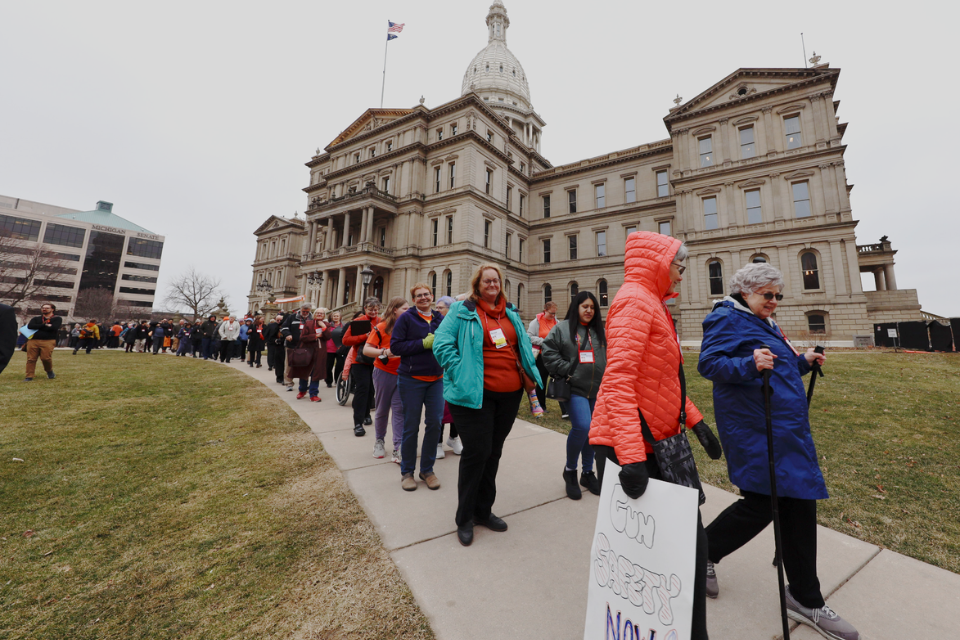
The storytelling of these United Methodists and so many more on Advocacy Day was powerful and inspiring, and meetings with legislators impacted the day’s voting. While people were meeting with lawmakers, the House moved the safe storage bill package down to the voting floor, which wasn’t expected. Then, later that evening, the House passed the bill with bipartisan support.
It was surprising how everything aligned on Advocacy Day. The March 22 date had been scheduled many months ago, and it’s always difficult to predict what the legislative docket will be on any given day. So, the fact that gun safety legislation was being discussed by the House Judiciary Committee and then moved to the floor for a vote on Advocacy Day was serendipitous. And according to Rep. Julie Rogers, it was “quite powerful” to witness.
Rogers was thrilled with the bipartisan support of the safe storage bill package. She felt it underscored the importance of advocacy and the value of lawmakers hearing from their constituents. Many groups of professionals and lobbyists come to Lansing to speak out on various issues, but the effects aren’t the same. “When a lawmaker,” she said, “can hear from their constituents in their own words, sharing personal stories, I think that helps influence people. And I certainly think it had an effect last week.”
Rogers also reflected on other ways United Methodists had made impressions on legislators and staff during Advocacy Day. She noted how everyone was respectful and genuine and shared specific stories about gun violence that affected people in their communities.
She also talked about the Christian witness participants gave to everyone they met. She said, “I’ve heard from staff of lawmakers that they had such a positive and surprising experience that they are considering going back to church for the first time in years. I’ve had that conversation over and over again.” Also, staff were impressed with the notion that prayer and action do not have to be mutually exclusive for Christians. “You could do both,” Rogers explained. “You could have prayer, and then you could come up to Lansing and have action.”
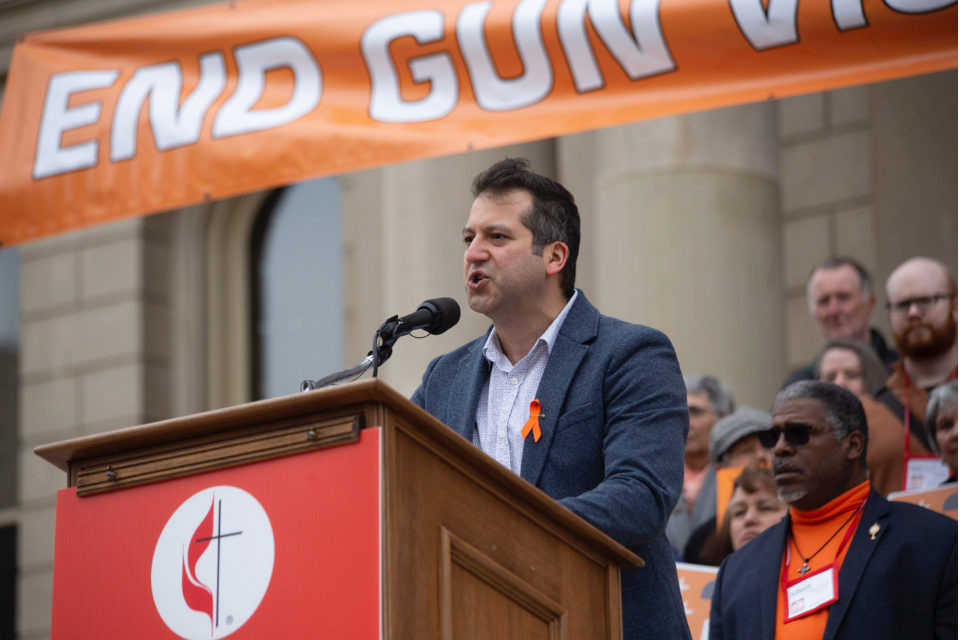
For the 300-plus United Methodists and friends who met in Lansing last Wednesday for Advocacy Day, the refrain heard time and again from participants was how empowered they felt doing something like this as people of faith, together. There is strength in numbers, and no one was alone in their efforts. The Michigan Conference provided time and space and support for faith-initiated advocacy, storytelling and honest conversation, and doing no harm and living into the “big tent” United Methodist ethos many people talk about.
Advocacy Day leaders are asking United Methodists in Michigan to continue the momentum sparked by Advocacy Day by contacting their representatives and asking them to move forward with passing the extreme risk protection orders bills yet to be voted on by the House. The four bills in motion are 4145, 4146, 4147, and 4148 (look them up here by number). The House is expected to pick these bills back up in the next couple of weeks.
There is hope among leadership in the Michigan Conference that future Advocacy Days will address other justice matters. That is Rep. Julie Rogers’ hope as well. “While it was certainly powerful and important, I hope we can build on this and have the capacity to do an annual event because there is no shortage of topics that need to be advocated for.”
Last Updated on January 31, 2024

